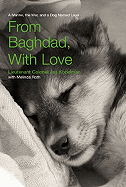
 Display this book by the register and you'll be reordering in a nanosecond. The most appealing cover of the year delivers a book that lives up to the jacket's promised sweetness; however, this is not a saccharine tale. Its charm is more than balanced with a gritty, black-humored narrative by a tough Marine in a really tough place.
Display this book by the register and you'll be reordering in a nanosecond. The most appealing cover of the year delivers a book that lives up to the jacket's promised sweetness; however, this is not a saccharine tale. Its charm is more than balanced with a gritty, black-humored narrative by a tough Marine in a really tough place.Lt. Col. Jay Kopelman first met the raggedy little puppy who roo-roo-roo-ed his way into the combat veteran's life when his Marine unit, the "Lava Dogs," was sweeping an abandoned house in Fallujah. At first mistaking the click of little paws for--grenade pins? timed explosives? an insurgent?--they inexplicably held their fire long enough to see a careening furball barrel towards them. "I see the fear in his eyes despite the bravado. He's only a puppy, too young to know how to mask it, so I can see how bravery and terror trap him on all sides while testosterone and adrenalin compete in the meantime for every ounce of his attention. Recognize it right away." Kopelman picked him up, mesmerized by his energy and bluster. "I liked the way he felt in my hands. I liked that he forgave me for scaring him. I liked not caring about getting home or staying alive or feeling warped as a human being--just him wiggling around in my hands, wiping all the grime off my face."
They took the dog back to camp secretly, because he came with a problem: General Order 1-A, which prohibits caring for or feeding any type of domestic or wild animals, and is taken quite seriously by the military. "That's because they've invested a lot of time and money into trashing your moral clarity, and they don't want anything like compassion messing things up. Your job is to shoot the enemy, period, and if anything close to compassion rears its ugly head, you better shoot that down too, or you're in some deep, scary shit." Kopelman says while it feels good to do what you're trained to do, it doesn't feel so good about it feeling so good. What do you do with yourself later? At some point between the afternoon he saw dogs scavenging dead bodies and the time he found Lava cuddled in his sleeping bag, he began to rationalize breaking the rules. He started asking friends and family for help in getting Lava stateside, although they had a hard time reconciling the person they knew with the word "puppy": "They're all scared that if I don't get killed, I'll lose my mind in Iraq and end up eating raw meat, collecting weapons and sending anonymous scary letters to people I don't know. So when I tell them I have this puppy and then there's this long silence, I can sense them connecting the dots between who I was when I left and who they're terrified I'll be when I get back." Soon after his decision to save Lava, the Department of Defense hired contractors to kill all non-military dogs on bases, and time for the rescue began to run out more quickly. But Kopelman was determined, even though the mission was lunacy.
Shipping Lava to the states presented an almost insurmountable task. It was a maze of moving him from Fallujah to Baghdad, from the Green Zone to the Red Zone, from there to Syria, or Jordan, or maybe Kuwait. Then there were the vaccination papers, the official papers, the whatever papers. Many people were involved, from the Lava Dog Marines to the IAMS pet food company to NPR correspondents to folks at the Helen Woodward Animal Center; NPR's Anne Garrels took care of Lava in Baghdad and managed to get him out, and saying that was difficult is a mere whisper of the reality; "Sam" was one of the Iraqis who helped at the NPR compound, who said he'd rather sacrifice an eye than take care of an unclean animal, who ended up scouring the city for dog biscuits and teaching Lava how to play soccer.
Jay Kopelman has written a memoir that will steal your heart just as Lava stole his, but it's not all fluffy puppy and brave Marines who melt at a wagging tail. The reality of Iraq is front and center, where the government announced that it had stockpiled hospital beds and medical supplies in the event of democracy happening after the elections; where "in our rush to hand out private contracts for Iraq's reconstruction, oversight was shoveled away with just about everything else including sanity"; where Chevy Suburbans are sold with the slogan "Let us bite the bullet--not you!" With the chaos and futility and brutality of the war, he knows that some will wonder why he focused any energy on a dog at all, and he has a fine answer. As for the others who cared for Lava, what did the little guy do for them? "[His] presence at the compound allows all humans a temporary exit pass from reality and maneuvers them through various checkpoints into the 'Land of Make Believe' where puppies romp on plush, green grass and it's a beautiful day in the neighborhood."--Marilyn Dahl

